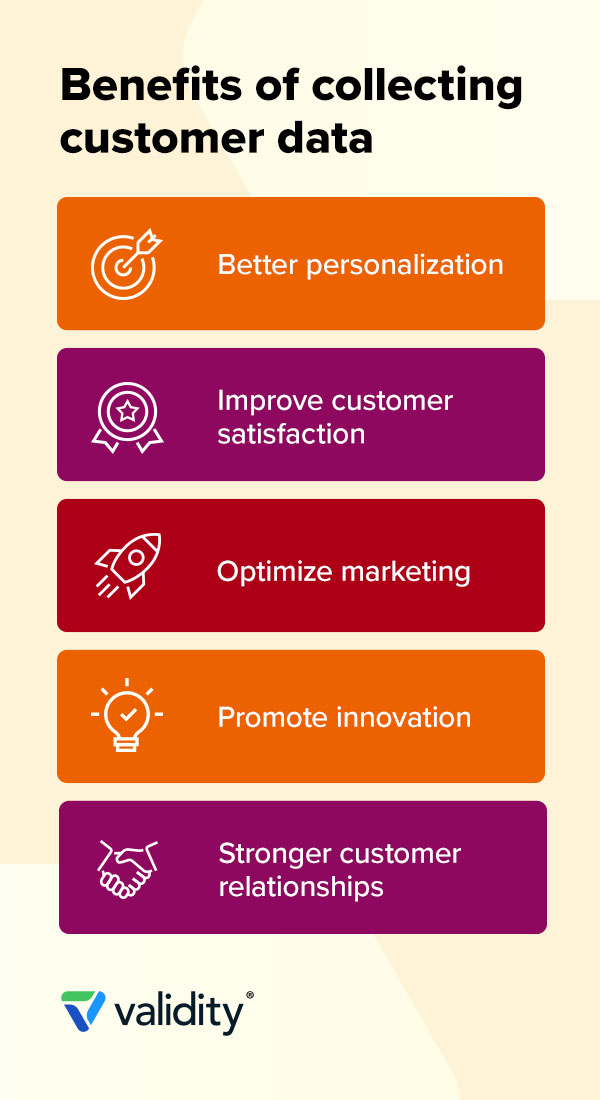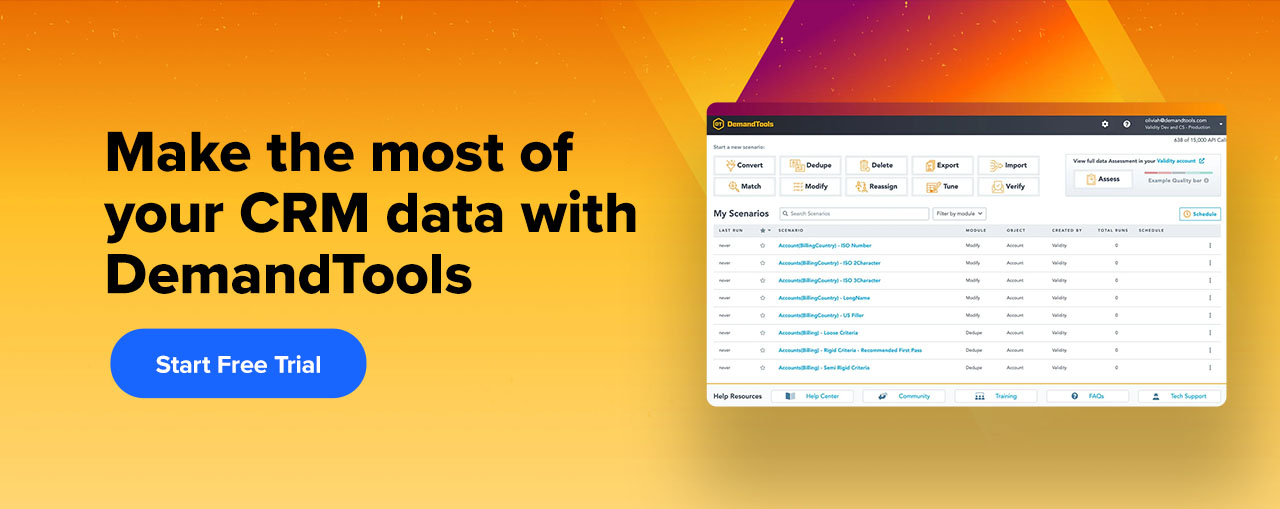
In an ever-growing, interconnected online marketplace, getting an edge over your competition is critical. Your operation needs to do more than meet customer needs—you need to predict what customers will need next. Businesses that can understand and anticipate customers’ needs use data collection to achieve their goals. Gathering and analyzing customer data gives your company valuable insights that can boost your customer experience and marketing strategies.
Customer data collection builds bridges between your business and its customers. You’ll tailor your offerings to customer needs and new trends while engaging customers meaningfully. Exploring innovative ways to collect customer data gives your company a leg up while providing customers with the best possible business experience. Whether you want to learn better ways of collecting customer data or how to optimize your data management, our guide can boost your efficiency.
The importance of customer data collection
Collecting customer data is a key part of modern business strategy. With so many websites and companies fighting for consumer attention, businesses need to find ways to stand out. Personalizing experiences with customer data lets you create customer-centric approaches. Here are some of the reasons why customer data collection is important to your operation:
Enhances customer experiences: Satisfied customers are crucial for a thriving business. Collecting customer data means tracking preferences, feedback, and behaviors. With this data, your team can tailor products and services to meet audience needs. A personalized approach makes customers feel seen and appreciated. This connection can build brand loyalty and repeat business, growing your consumer base.
Drives informed decision-making: Using customer data in your decision-making process can make your efforts more precise. Customer data gives you the insights needed to make better choices. Knowing what a customer likes lets you promote related products and services to them, increasing your chances of securing a repeat customer.
Boosts marketing efficiency: Effective marketing means reaching the right people at the right time. Customer data collection lets you segment your audience, creating more targeted, successful marketing strategies. Simply put, you’ll get more out of your campaigns. Leveraging data means you can craft personalized messages that resonate with your customer base, increasing engagement rates.
How to collect customer data
While there’s a lot of customer data available to businesses, you need the right data collection methods to capture the most valuable bits. Let’s look at methods of collecting customer data and what data you need to boost your sales and marketing strategies.
What data to collect from customers
Collecting customer data is about finding balance—you need to efficiently get the most helpful information without being too intrusive. Some helpful customer data you might like to collect could include:
Demographic: Demographic data includes customer age, gender, income, job, and education. You can use this information to create customer segments and tailor marketing campaigns. Knowing the demographics of your customer base lets you build more effective, targeted strategies.
Psychographics: Psychographic data is more about what’s happening inside customers’ minds. What are their interests, motivations, and lifestyles? What are their attitudes, hobbies, values, and unique choices? With this data, your company can create detailed customer profiles and highly personalized marketing and development efforts.
Behavioral: Behavioral data comes from how customers interact with your brand. Website activity, purchase history, social media interactions, and email engagement show you patterns in customer behavior. Knowing what keeps people engaged with your business lets you make more effective marketing and brand decisions.
Feedback: Your business can collect direct feedback from customer support, reviews, and surveys. You can find out what customers like and dislike about your products or services and adjust as needed.
Contact information: Email addresses and phone numbers let you maintain communication with your customers. Personalized updates, offers, and follow-ups create stronger bonds with these contacts, encouraging them to remain attracted to your brand.
Data collection methods
There’s unlimited customer data out there. Successful marketing involves knowing what data to collect and how to collect it. The more efficient your data collection and storage, the easier it will be to use that data for your business. Here are some ways to collect customer data:
Surveys: As previously mentioned, surveys and customer feedback give you direct insight into your consumers. They let customers give you their preferences, thoughts, and experiences as they see them. With quality surveys, you can ask customers exactly what you need to know. Your business can also get insight into areas of improvement and satisfaction.
Website analytics: Websites can track certain customer behaviors. Online tools will follow and store user behavior, showing you how visitors interact with your site. You’ll see page views, time spent on each page, and navigation paths. Website analytics help identify the content that resonates most with your audience and what improvements the site might need.
Social media: Social media platforms are another excellent information source for businesses. People are more open on social media, letting you see their preferences and behaviors. Monitoring comments, interactions, and mentions allows businesses to spot trends and opinions. You’ll get a better understanding of your audience’s needs and interests.
Transactional data: Transactions can also tell a story. Look at purchase history, transaction frequency, and payment methods. This information tells you more about customer behavior. Use this data to understand buying habits and predict future purposes. This method also helps you identify high-value customers who might get the most out of personalized offers and loyalty programs.
Customer support: Monitoring customer support interactions can give you real-time insights into common issues, complaints, and areas for improvement. Use chat, call, or email records to spot recurring problems and enhance the customer experience.
Customer relationship management (CRM) systems: CRM systems are invaluable tools for collecting and organizing customer data. These systems consolidate information from different sources, giving you a comprehensive profile for each customer. CRM systems track service requests, interactions, and sales, letting your business maximize customer management. CRM systems allow you to enjoy up-to-date, accurate data in a convenient location whenever you need it.
Benefits of collecting customer data
Collecting customer data can be a game-changer for your business. Whether you want to retain more customers or reach a specific audience, customer data can give you the insights you need. With accurate data, you can achieve better customer relations, more traffic, and lasting relationships. Let’s take a look at some of the benefits customer data can offer your business:
Better personalization: Everywhere customers go, they see brands trying to get their attention. Customer data allows businesses to understand customer preferences and behavior and create personalized marketing campaigns and product recommendations for customer segments. A more personalized approach meets customers’ unique needs, showing them you’re paying attention to them.
Improve customer satisfaction: Happy customers are repeat customers. Use customer data to spot pain points and meet customer expectations. You’ll establish a proactive approach that demonstrates your commitment to customer satisfaction. When customers feel heard and valued, they’re happier and more likely to stick around.
Optimize sales and marketing outreach: Sales and marketing take time, labor, and money. The more effective your outreach is, the more resources you’ll save. Customer data lets you accurately segment your audience, building more effective sales and marketing strategies. You’ll see improved campaign performance and less resource waste.
Promote innovation: Customer data collection can also help you meet needs customers don’t even know they have. Your team can spot innovation opportunities by looking at feedback and emerging trends. You’ll develop new products and services before consumers are oversaturated. Data can help you stay ahead of the curve and impress your customers.
Stronger customer relationships: Letting customers know you understand them creates more meaningful interactions. When customers feel like you’re improving their services, they’ll trust you more. Use customer data to build better brand loyalty and strong word-of-mouth from customers to their friends and family.
Risks and challenges of collecting customer data
While customer data can open new doors for your company, your business must carefully navigate the risks and challenges of data responsibility. Addressing these concerns can provide your team with all the benefits of data collection while protecting customer trust and staying regulation-compliant. Customer data challenges include:
Privacy concerns: Keeping data private is a significant data concern. In 2023, over 350 million people were affected by data compromises in the U.S. Customers are increasingly aware of how companies use their data. Businesses need strong data protection and transparent policies to build and maintain trust. In the private sector, Apple in particular has improved consumer privacy protections with the release of iOS 17 and Link Tracking Protection (LTP) in 2023, and Mail Privacy Protection in 2021
Regulatory compliance: Businesses must comply with data protection regulations like the California Consumer Privacy Act (CCPA) in the United States and the General Data Protection Regulation (GDPR in the European Union). These regulations restrict how companies collect, store, and use customer data. Noncompliance can result in fines, legal action, and reputational damage. Marketers should follow up with their own legal and privacy teams for the most up-to-date information on relevant consumer data privacy regulations in their area.
Data quality: Your business also needs to ensure customer data is accurate. Outdated or inaccurate data can waste resources and lead to ineffective strategies or targeting methods. Use data validation processes and updated data to form your foundations. You’ll ensure data reliability and see better results. Solutions like Validity DemandTools helps businesses clean and manage their CRM data in less time.
Ethical considerations: When collecting data, consider ethical concerns beyond legal issues. Businesses must respect customers’ rights and preferences and avoid manipulative data practices. Put customers first and prioritize ethical data use—you’ll see marketing results while building customer trust.
Data volume: Managing all that customer data can be overwhelming. Your business needs to invest in the right tools to manage, analyze, and implement customer data. Collecting customer data in CRM systems can help you avoid overload and get the most out of your collected data.
Make the most of your CRM data with DemandTools
Transform your customer data management and watch your business thrive with Validity DemandTools. As an industry leader in data quality, Validity empowers thousands of organizations to increase email engagement, boost sales productivity, and drive growth. With DemandTools, you can streamline your data cleaning processes, ensuring your Salesforce data is accurate, consistent, and actionable.
With on-demand bulk deduplication, automated data standardization, and mass modification capabilities, you can keep waste down and productivity up. Enjoy report-ready data that boosts the performance of your marketing, sales, and support teams.
See the difference clean data makes with a DemandTools demo today!


